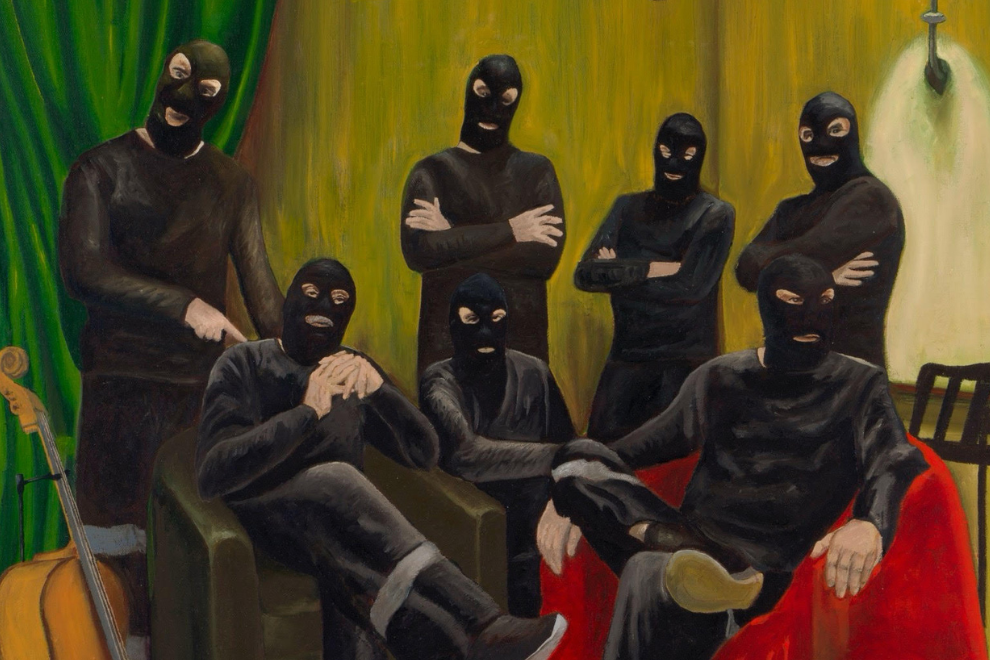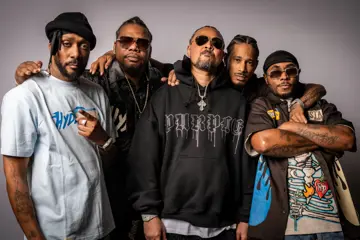 TISM
TISMIn their own idiosyncratic (and existential) style, masked cultural marauders TISM talk about almost anything but their new album Death To Art and the attendant national tour.
After a new two-decade absence from the spotlight, iconic Melbourne outfit TISM have in recent times dusted off the balaclavas and slowly but surely inched their way back into the Australian consciousness, the band now well-and-truly extant rather than extinct.
What started out in 2020 as a simple vinyl and CD reissue of their incredible back catalogue - which spanned from the late-‘80s right through to the early-‘00s - quickly devolved into a return to the live realms, with TISM appearing to great fanfare at the 2022 edition of the Good Things festival (amidst a line-up simultaneously ludicrous and perfect for such an endeavour).
At this juncture new music was surely inevitable, and in late-2023, TISM released the single I’ve Gone Hillsong - their first new track in 19 years - which was followed in 2024 by a regular stream of new tunes, culminating in the recent release of their long-awaited seventh album, Death To Art.
Don't miss a beat with our FREE daily newsletter
The ambitious double-album contains everything that a discerning TISM fan could hope for, the collection musically rife with typically earworm songs that burrow into your brain and become lodged in the subconscious whilst lyrically finding the band in outrageous form.
Throughout Death To Art, TISM build upon their considerable mythology and lore whilst concurrently ripping it all to shreds, at the same time eviscerating two decades’ worth of brazen false idols and other miscellaneous topics or taboos which for some reason captured their virile imaginations.
Of course, the rules of rock’n’roll dictate that a new album necessitates a tour, so TISM - strangely for them - acquiesced and announced an east coast tour which has found them setting up shop in venues far larger than they ever headlined during their halcyon years (albeit joined in each city by a large, era-appropriate array of support acts in Machine Gun Fellatio, Eskimo Joe, Ben Lee and The Mavis’s).
And finally, with a new album and an accompanying tour, comes press obligations. TISM have never shied away from press obligations in the past, in that they’ve willing partaken in interviews, it’s just how they’ve partaken in the interviews which has caused so much consternation to generations of journalists.
Stories of TISM fucking around with rock writers are both legion and legendary - ranging from their earliest interviews being conducted solely by fax through to outrageous schemes which were incredibly inventive in scope and execution - with the one common denominator being that at the end of the process, regardless of their personal TISM-induced purgatory, the writer came away (usually thinking, ‘WTF just happened?’) armed with very little usable content for their article, apart from an appraisal of the experience itself.
TISM somehow turned often-boring press obligations into an exercise in outsider art that’s both brilliantly subversive and pointlessly counter-productive, in that they never take the opportunity afforded them to seriously dissect their own music or mythos. Maybe that’s the point.
When The Music catches up over Zoom with TISM founders Humphrey B. Flaubert and Ron Hitler-Barassi - also the band’s co-frontmen and creative engine room - there are so many obvious questions just waiting to be asked about this recent flurry of activity: why did love for TISM seem to grow so exponentially in their absence, and will this be jeopardised by their return? What did they take away from the rampant commercial success of 2020’s The TISM Omni-Album (a transparent vinyl release - purportedly pressed at Abbey Road Studios in London - featuring two sides of complete silence)? Was the recurring motif throughout Death To Art, “Where have TISM gone?”, a rhetorical question or a genuine quest? What sort of fitness regime did they undertake to get through the physical rigmarole of their recent live extravaganzas with such apparent ease (and would it be WADA compliant)? The list goes on…
In the end, we’re afforded the opportunity to sneak in one question about the transformation of old live fave 40 Years - Then Death - a poignant (albeit slightly deviant) treatise on mortality from their lauded debut album Great Truckin’ Songs Of The Renaissance (1988) - into the infinitely more terrifying and paranoia-inducing 14 Years - Then Death at recent live shows.
But an interview with TISM isn’t about the destination. It’s about the journey (as many a despondent journalist has told themselves on a long, sleepless night), and our journey with TISM went a little bit like this:
[Humphrey B. Flaubert joins the meeting, sartorially nondescript apart from the prominent black balaclava]
Humphrey B Flaubert (HBF): Hello Steve, look at all those books behind you.
The Music (TM): It’s an affectation.
HBF: Well, that's right. I like a man with good affectation, and I see they've been hastily popped together there. In fact, I think you’d better be very careful - you could be killed.
TM: There’s worse ways to go.
HBF: Well, I suppose, yeah, we've all got to go some way, really. I’m certainly contemplating it right now in this stupid outfit I'm wearing, but don't worry because any second now, my friend's going to take over, and I'm just going to sit back and wait until your books collapse on top of you.
TM: Awesome. How's it been? Have you been well?
HBF: I have, yes. We seem to exist again, which causes me a great deal of confusion. And, you know, I’m not really sure it's the greatest life choice. But we're doing media. Christ, we were talking to Paul Cashmere before, even Australian Musician magazine, which is pretty illustrious.
TM: Fantastic.
HBF: We've pinned our sail to the mast of non-musicianship for years, and yet here we are. I'm presuming we're going to... oh, here’s Ron.
[Ron Hitler-Barrassi enters the meeting wearing naught but striped boxer shorts and a balaclava, gyrating wildly to a track by The Kid LAROI, his chiselled (-ish) abs often far too close to the camera]
HBF: That’s very ‘The Kid LAROI’ there, Ron.
[Ron’s Zoom disconnects]
HBF: Well, he's gone again. I'm not sure how you put that into words, really.
TM: No, it's interesting for a print one.
HBF: You could describe it as ‘The Kid LAROI just returned from his big ARIA win’. I was actually talking to Paul before about The Kid LAROI and how I'm quite impressed by the way he only capitalises the second half of his name - you know, a sentence case up until LAROI.
I mean, we obviously don't have that sort of restraint because you would have the lowercase ‘ti', and the ‘SM’ would be in uppercase. But we didn't think that through. I mean, we really didn't think a lot of things through - clearly, 18 years of not thinking things through. But, you know, that's probably my biggest regret, that the the lower case ‘ti’ would have been so much better, you know, like silverchair - not many bands go the lower case, do they? They were a lower case band…
[Ron rejoins the fray, now drinking from a pot of beer at regular interviews]
HBF: Yes. I mean, he's obviously a fan of Alfred Jarry's work, ‘Id Ubu LAROI’, it was a novel written I think in the 19th century - or was it the early 20th? - it was about Donald Trump, and, you know, clearly, he’s sort of based his career on that. But yes, you're right, The Kid, The King, although it does have a certain sort of ‘boxer introduction’ vibe…
RHB: It does have a declaratory feel, doesn't it? Like it’s, ‘The Kid, The King!’ Yeah, I take it back actually, maybe he should have won an ARIA. He got ripped off at the ARIAs!
HBF: I think so, yeah. But anyway, I'm sure you've got a bit of Jarry in there behind you, Steve; it certainly looks like you’ve got a bit of Jarry behind you there, Steve, and a bit of Zola. I mean, the readers of The Music - if you would call them that, the people who sit there masturbating while they… you know, ejaculating on their laptop with The Music on it - they would appreciate the fact that you are an erudite man… an erudite man, Steve.
But now you find yourself talking to the band that uses big words, and we're all here like a bunch of… well, we're all old obviously; I mean, you've scrubbed up all right, but let me tell you, Ron and I are quite horrifically old - despite Ron's airbrushed body - and here we are talking about Jarry when no one gives a fuck. What could we possibly talk about that would engage with the one 15-year-old who's going to open this article?
RHB: Well what about other early absurdist plays like ‘Rhinoceros’ by Ionesco, possibly?
HBF: Ionesco!
RHB: Obviously early Beckett, I think there's a lot of 15-year-olds who are into early Beckett and stuff. You know, you could go ‘Waiting For Godot’, and then we could move on to ‘Rosencrantz and Guildenstern Are Dead' of course, using the Beckett tropes of the two lost clowns in an existential universe that cares not for them. I haven't met a 15-year-old, actually, who’s not into that. I doubt whether Troye Sivan is… I actually think it might be a rigged election - I'm almost certain that it was Samuel Beckett that won the ARIAs last night.
HBF: That’s right. Yes, yeah. Yeah, I think so. It’s very important, of course, to say at this point… Night Train To Venus.
RHB: Night Train To Venus, that's right.
HBF: Night Train To Venus, that’s all we can really say. Over to you, Steve.
TM: My first question has got to be about 40 Years - Then Death, now 14 Years - Then Death. That’s really grim, did you have to do that to us?
HBF: Well, yes, we are a grim bunch, aren't we, Steve? It’s disappointingly so, but it's not necessarily an unhappy song. You know, let's try and find a positive.
RHB: The truth will set you free, Steve. I mean, I think the best encapsulation of the inevitable corporeal limits to our human agency is, of course, the Jewish scriptures, where there's a sort of inevitability about the demands that man must obey from God.
In a similar way, Oedipus, despite - in fact ironically, brilliantly, but tragically - despite his best will the very actions he does to escape his fate don't mitigate that fate, they forward that fate. Now, there's a tragic certainty about the demise of our corporeal selves, and of course, there is no other self we've got, and the only solace that we've got is we know the truth, Steve. That we don't blind ourselves with fairytales. As Nietzsche said, you know, the truth is terrible, but there's some… joy’s too big a word, but there's some dignity in embracing that truth. Put that in your fucking magazine, mate!
TM: I don't want to face down my own mortality at a gig, though. It's distracting or something.
RHB: Well, that's a very good point; I hadn't thought about that. Neither had Nietzsche, Euripides, all the authors of the Jewish scriptures… if only there were gigs back then, we’d have none of that shit, mate! Thank God we've got YouTube - fuckin’ hell, just skip to the next shit! Have you read those fucking books behind you or what?
TM: No, we talked about that earlier; it’s an affectation. Does this tie in with the bonus tracks on Death To Art, like the hearse ride to Springvale Cemetery? You’re putting it in our face all the time; I know I'm gonna die.
RHB: It's a very good point, I feel like retracting that album, it’s just stating the bleeding obvious, is it not? Like, we're all on the way to death, there's no real consolation that there’s a limited span and we'll arrive at the same destination, be it Springvale Cemetery - as is the metaphorical conceit of the album - or it doesn't matter where else, you're all in the same place.
I mean, you know, the true silent majority, are they not the dead? You know, that silent vote, that silent vote can't be rigged - it’s an election we're all part of, and finally, we will join that majority. But I do see your point, you're at a gig, you just want to get pissed and pull a chick, so I do see the tension there between your argument, you know.
I feel though there's only one solace possibly, Steve, and that is art itself. Is there not some sort of tenuous… well, not immortality, because in the end, it's all just gonna be - as the physicists have proved, it's not speculation - trillions and trillions and trillions of years where it's just proton soup.
There will be no statues, there will be no art, there will be no world or relationship or love or God, it is an unimaginable amount of time where it's just protons floating. This is not a debate or a hypothesis; that's where we're all heading. But still, for the brief amount of time that human existence counts for anything, possibly the solace is art.
And if we were at all good artists, we would clutch at that solace, but I'm afraid, Steve, this is why at the end of our gigs, we throw the paintings out to the crowd to be destroyed, because if there's one thing a man should know - as that brilliant thinker told us, Clint Eastwood - it’s his limitations, and we definitely know ours, I'm afraid.
HBF: That was a beautiful encapsulation. I think of the journey that we're all on, Steve. I think that Ron has done such a wonderful job, and I particularly like the way he ended his commentary with a full stop. Which is, you know, so often misplaced in society at the moment - these people going around putting full stops at the end of every word. That doesn't convey to me the cyclical nature of life: life has a beginning and a middle - like a bridge, if you were - and then an end, a final double chorus. The cyclical nature of life is pretty much, you know, the way ‘The Kid, The King’ has a kind of a sort of rhythm to it, almost like a… is it an iambic pentameter? I don't know, but it certainly feels like it returns.
RHB: It does.
HBF: And it's like, you know, that recent invention… those Australians who claim they can use bottled lightning to make fertiliser. That's the cyclical nature of our journey. And I think it's kind of a description of TISM really - we take bottled lightning and we make it into fertiliser.
RHB: Now, Steve, I don't want to step in here, Steve, but if you don't mind… Humphrey, what the fuck are you talking about? Bottled lightning, is that… what are you talking about? To fertiliser? It’s like Night Train To Venus, Humphrey; I can't even make sense of it. Is this a story in the media? Like, what is this?
HBF: Well, it was just something I was talking about at the pub on Thursday night - if you could bottle lightning, what would you do? You could turn it into fertiliser. I don't think TISM is exactly doing that, though.
I mean, for bottled lightning, the human condition is like a transient explosion of light and sound, and we are the container for it, and then we turn that into something which makes your azaleas grow - that’s probably overstating it a little bit because I think we're a bit more like dog poo, you just can't do anything with it. You’ve pretty much just got to throw it in the normal bin. But I do like that idea, and I think I'll patent it. You know, I think, if enough people stood with a bottle on a golf course on a stormy night, one of them eventually would surely turn it into fertiliser, don't you think, Ron?
RHB: If there was… if there was a million monkeys for a million years with a million bottles eventually you'd think that somehow...
HBF: It would surely have to happen.
RHB: The monkey would be holding the lightning on… the golf course, I think it was? On the golf course, the lightning would hit the bottle, and it would be turned into fertiliser. I actually… yes, it's hard to argue against.
HBF: It’s got legs. I think it's got legs. You know, I walk the dog past the golf driving range, and I think I might just sort of pop into the owner of the golf driving range and say, listen, stop these people driving balls, get them all to get out there with a bottle.
RHB: Humphrey, you’re not taking the readers of The Music magazine for mugs here, I can see their lead story - I mean, obviously this is headline material! But what about the readers of The Music - by the way, nice definitive article there, it's not just ‘a music’, is it? It's not just any music, it's The Music.
HBF: The Kid, The Music.
RHB: Dear Mr Bell, about Humphrey B Flaubert’s contention that a monkey would turn a bottle of lightning on a golf course, what about, let's say, a tennis court or some other sort of sporting arena? Is it equally likely? See, this is the questions they're going to raise at The Music.
HBF: Yeah, I think so. Yeah, I could be out of my depth here, I think. I may have bitten off more than I can chew. I'm just sort of thinking of John White, who they called ‘The Ghost’ - he was a midfielder in Spurs' 1961 doubles team - who was sadly killed by a bolt of lightning while on the golf course and if only...
RHB: Did they call him ‘The Ghost’ before that happened?
HBF: It’s a rather unpleasant name for someone who's just died, isn't it?
RHB: Steve, we've got to go, it's six o’clock! Shit. Hold on.
[Ron puts Kid LAROI back on and resumes gyrating]
HBF: Look out!
[Ron and Humphrey both promptly exit the Zoom meeting]
TM (to no one): It’s good to have you back, guys…
POSTSCRIPT: Between them, the TISM members said the phrase Night Train To Venus four times during the interview - seemingly apropos of nothing - with a cursory search of the internet only unveiling a maligned 1993 German contemporary gothic-horror film directed by Carlo U. Quintero and starring Hugh Grant and Malcolm McDowell (which Grant in a 2012 radio interview described as “the worst film I’ve ever been in”), and a 2022 song by an outfit named Kebab Traume (apparently German for “kebab dreams”) described on Spotify as being of the ‘Ukrainian Electro’ oeuvre. I refuse to go any further down this particular rabbit hole.
Death To Art is out now. TISM are currently touring across Australia - find tickets to their show at the Hordern Pavilion here.

















